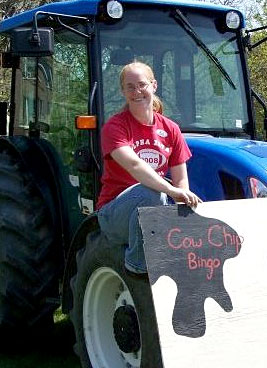
Second in a series of profiles celebrating the Class of 2011.
Majors: Plant Sciences, Agricultural Sciences
Hometown: Pine City, N.Y.
Why did you choose Cornell?
I attended 4-H Career Explorations on campus every summer since middle school. I fell in love with the campus and all the friendly open-minded people here who encouraged us to explore ideas.
What was you main Cornell extracurricular activity? Why is it important to you?
I’m a member of Alpha Zeta, the co-ed, ag-based fraternity. In addition to sponsoring and organizing Ag Day on campus, we’re very involved in philanthropy. We raised money for 4-H and to help farmers whose barns burned down. We even organized a group of volunteers to help with cranberry harvest on a fraternity brother’s farm in Massachusetts over fall break.
Who or what influenced your Cornell education the most?
The huge number of hands-on classes in the plant sciences. I work best when there’s a blend of theory and practice.
What was your most profound turning point while at Cornell?
After my sophomore year, I did a summer internship with Cornell Cooperative Extension in Essex County, working with high tunnels (unheated greenhouses that help farmers extend their growing season for vegetables, fruit and flowers). It helped me realize that I really like field research. Before that, I thought getting a Masters degree would be a chore. Now I know that research can be fun and relevant. Last summer, I did more field research as an intern at the New York State Agricultural Experiment Station in Geneva, working on cover crops to suppress weeds and improve soil health.
Did any of your beliefs or interests change during your time at Cornell?
Coming to Ithaca was mind-opening. I’ve learned to think critically about complicated systems without getting overwhelmed – knowing that I can understand them and change them.
What was one of your greatest challenges attending Cornell?
Learning how to study. It’s a whole different game than in high school. But once you get the hang of it, it’s a wonderful environment for learning. I also learned that grades don’t necessarily reflect how much you get out of a class. Some of the classes where I learned the most I didn’t necessarily make my best grades.
Any advice for freshmen?
There are so many opportunities here. Find what inspires you and put your heart into it. But don’t forget to stop and make friends, grab pizza and watch the sunset.
What are your plans for next year and beyond?
I want to get my Masters because I’d really like to work for Cooperative Extension. It’s a good place to help people solve problems, and there are opportunities to do research, too. But to be a good educator I think you need to understand growing operations on all levels. I got a lot of experience working in my family’s greenhouse. Now I want to go out and get more experience working with fruit and vegetable growers before I start grad school. I’m a very practical person.



Elizabeth! So proud of you 🙂